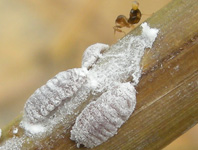Abstract
Two new species of cheilostome Bryozoa are described from the Faroe Islands archipelago. Cinclidia aculeata n. gen. et sp. is a new cribrilinid taxon, distinguished from other cribrimorphs by the skeletal characters of the frontal shield and ooecium, and the absence of avicularia. A second new species, Turbicellepora faroensis n. sp., is distinguished by the shape of the orificial sinus, peristome, and suboral and interzooidal avicularia as well as by the presence of distolateral, tube-shaped adventitious avicularia (paired or single). Examination of new material of congeneric species supports the validity of the new taxon and further clarifies the separate status of Turbicellepora tuberosa (Smitt, 1868) sensu Hansen (1962) and T. hansenae Denisenko, 2016.
References
Allman, G. (1856) A monograph of the freshwater Polyzoa, including all the known species, both British and foreign. Ray Society, London, 120 pp.
https://doi.org/10.5962/bhl.title.9143Bishop, J.D.D. (1988) A clarification of the type-species of Collarina Jullien, 1886 (Bryozoa: Cheilostomata: Cribrilinidae). Journal of Natural History, 22, 747–755.
https://doi.org/10.1080/00222938800770481Bishop, J.D.D. (1994) The genera Cribrilina and Collarina (Bryozoa, Cheilostomatida) in the British Isles and North Sea Basin, Pliocene to present day. Zoologica Scripta, 23, 225–249.
https://doi.org/10.1111/j.1463-6409.1994.tb00387.xBishop, J.D.D. & Househam, B.C. (1987) Puellina (Bryozoa; Cheilostomata; Cribrilinidae) from British and adjacent waters. Bulletin of the British Museum (Natural History), 53, 1–63.
Bock, P. (2016) Turbicellepora Ryland, 1963. Available from: http://bryozoa.net/cheilostomata/celleporidae/turbicellepora.html (accessed 15 April 2017)
Busk, G. (1852) An account of the Polyzoa, and sertularian Zoophytes, collected in the voyage of the Rattlesnake, on the coasts of Australia and the Louisiade Archipelago, &c. In: MacGillivray, J. (Ed.), Narrative of the voyage of H.M.S. Rattlesnake,…during the years 1846–1850. Vol. 1. Boone, London, pp. 343–402.
Denisenko, N.V. (2016) Two new species of the genus Turbicellepora Ryland, 1963 (Bryozoa: Celleporidae) found on Lophelia coral from the Greenland slope. Zootaxa, 4066 (2), 177–182.
https://doi.org/10.11646/zootaxa.4066.2.7Denisenko, N.V., Hayward, P.J., Tendal, O.S. & Sørensen, J. (2016) Diversity and biogeographical patterns of the bryozoan fauna of the Faroe Islands. Marine Biology Research, 12, 360–378.
https://doi.org/10.1080/17451000.2016.1148817Hansen, K.B. (1962) The Godthaab Expedition 1928. Bryozoa. Meddelelserom Grønland, 81, 1–74.
Hansen, B. & Østerhus, S. (2000) North Atlantic–Nordic seas exchanges. Progress in Oceanography, 45, 109–208.
https://doi.org/10.1016/S0079-6611(99)00052-XHayward, P.J. (1994) New species and new records of Cheilostomatous bryozoa from the Faroe Islands, collected by BIOFAR. Sarsia, 79, 181–206.
https://doi.org/10.1080/00364827.1994.10413558Hayward, P.S. & Hansen, K.B. (1999) Three newly recognized cheilostomate bryozoans from the British sea area. Journal of the Marine Biological Association of the United Kingdom, 79, 917–921.
https://doi.org/10.1017/S0025315498001088Hayward, P.J. & Ryland, J.S. (1996) Some British Phidoloporidae (Bryozoa: Cheilostomatida). Zoological Journal of the Linnaean Society, 117, 103–112.
https://doi.org/10.1111/j.1096-3642.1996.tb02150.xHincks, T. (1860) Zoophytology. Description of new Polyzoa from Ireland. Quarterly Journal of Microscopical Science, 8, 275–285.
Hincks, T. (1879) On the classification of the British Polyzoa. The Annals and Magazine of Natural History, Series 5, 3, 153–164.
Johnston, G. (1838) A History of the British Zoophytes. W.H. Lizars, Edinburgh, 341 pp.
https://doi.org/10.5962/bhl.title.110844Jullien, J. (1886) Les Costulidées, nouvelle famille de bryozoaires. Bulletin de la Société Zoologique de France, 11, 601–620.
Kluge, G.A. (1962) Mshanki severnych morei SSSR. Opredeleteli po Faune SSSR, Izdavaemye Zoologicheskim Institutom Akademii Nauk, 76, 1–584.
Kramp, P.L. (1934). Bryozoa. Zoology of the Faroes, 3, 1–39.
Lorenz, L. (1886) Bryozoen von Jan Mayen. Die Internationale Polarforschung 1882–1883. Die Österreichische Polarstation Jan Mayen, Beobachtungs-Ergebnisse, KaiserlicheAkademie der Wissenschaften, 3, 83–100.
Moyano, G.H.I. (1984) Chilean Cribrimorpha (Bryozoa Cheilostomata). Boletin de la Sociedad de Biología de Concepción, 55, 47–72.
Moyano, G.H.I. (1991) Bryozoa marinos Chilenos VIII: una sintesis zoogeográfica con consideraciones sistemáticas y la descripción de diez especies y dos generos nuevos. Gayana Zoologia, 55, 305–389.
Nordgaard, O. (1907) Bryozoen von demnorwegischenFischereidampfer “Michael Sars” in den Jahren 1900–1904 gesammelt. Aarbog for Bergen Museum, 2, 3–20.
d'Orbigny, A.D., (1851–1854) Bryozoaires. Paléontologie française. Description des Mollusques et Rayonnés fossiles. Terrains Crétacés, 5, 1–1192.
Ostrovsky, A.N. (2002) Brood chambers in cribrimorphs evolved by fusion of costae: further arguments. In: Wyse Jackson, P.N., Buttler, C.J. & Spencer Jones, M.E. (Eds.), Bryozoan Studies 2001. A.A. Balkema Publishers, Lisse, pp. 247–255.
Ostrovsky, A.N. (2013) Evolution of Sexual Reproduction in Marine Invertebrates: Example of gymnolaemate Bryozoa. Springer Verlag, Dordrecht, 356 pp.
https://doi.org/10.1007/978-94-007-7146-8Ostrovsky, A.N. & Taylor, P.D. (2005) Brood chambers constructed from spines in fossil and recent cheilostome bryozoans. Zoological Journal of the Linnean Society, 144, 317–361.
https://doi.org/10.1111/j.1096-3642.2005.00179.xRyland, J.S. (1963) Systematic and biologic studies on Polyzoa (Bryozoa) from western Norway. Sarsia, 4, 1–59.
https://doi.org/10.1080/00364827.1963.10409518Smitt, F. (1868) Kritsk förteckning öfver Skandinaviens Hafs-Bryozoer. IV. Öfversigt af Kongliga Vetenskapsakademiens Förhandlingar, 25, 3–320.
Souto, J., Berning, B. & Ostrovsky, A.N. (2016) Systematics and diversity of deep-water Cheilostomata (Bryozoa) from Galicia Bank (NE Atlantic). Zootaxa, 4067 (4), 401–459.
https://doi.org/10.11646/zootaxa.4067.4.1

